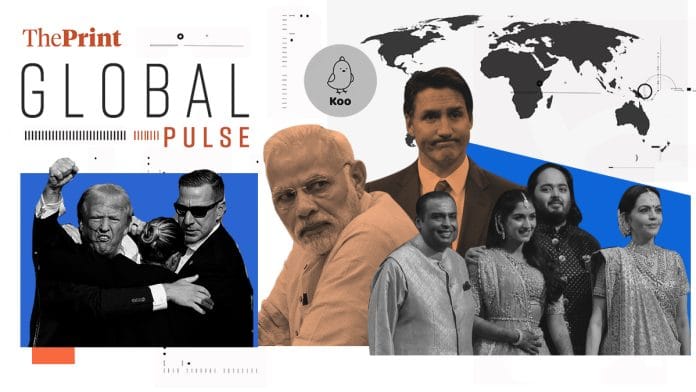New Delhi: An opinion piece in The Globe and Mail, titled ‘Canada-India relations: Where do they go from here?’, hopes that the meeting between Indian and Canadian prime ministers on the sidelines of the G7 summit is “a sign that the frosty relationship” between the two nations “is finally beginning to thaw”.
“With the (Indian election) vote now past, such nationalistic rhetoric may soften,” Vincent Rigby and Aftab Ahmed write, while noting that the relationship had begun to blister since the Air India Bombing in 1985.
The authors give three solutions — quiet diplomacy through recalling expelled ambassadors and reversal of freezing of visas, restarting trade talks, and leveraging their relationships with the US. “The U.S. could play a role in helping both countries find an uneasy compromise and permit the relationship to move forward,” the piece reads.
In an article — ‘What a $600m wedding says about India’s attitude to wealth’ — The Economist talks about the months-long celebration of the Ambani wedding. Although it highlights how seriously Indians take their Wedding functions, it shows the richest Indians, in this case, the Ambanis, “disconnected from India’s economic and social reality”. “Strong GDP growth and a soaring stock market have created more wealth for India’s rich but not that many new jobs or wage gains for its poor,” it says.
The wedding “contributed handsomely to India’s booming matrimony business, which generates perhaps $130bn a year in revenues (only food makes up a bigger share of Indians’ retail spending),” the article says, while listing the long string of celebrities, pop stars style icons and politicians that graced the occasion, some with their presence, others with performances.
“Across India, there has been an outpouring of support for Trump after Saturday’s assassination attempt,” writes Karishma Mehrotra in The Washington Post. She mentions the prayers being held in the national capital to ensure Trump’s safety and that this support is coming primarily from among “the ruling Hindu nationalist Bharatiya Janata Party”, whose leaders, like Assam CM Himanta Biswa Sarma and Amit Malviya. These leaders, she writes, also “drew parallels between the language of the Democrats in the United States and the main Indian opposition Congress Party”.
“Physical or otherwise, right-wing leaders across the globe are now active targets of the radical left,” the article quotes Sarma.
Benjamin Parker in the Financial Times looks at India’s tech policy. Start-ups such as Koo emulated US tech company models but lost their momentum early on in spite of a nationalistic user base. “Koo’s demise underscores the failure of efforts to replace US social media companies in India,” writes Parker.
Claiming that Koo gained popularity after the government’s “conflict with Twitter over the farmers’ protests”, the report titled ‘India shifts its strategy on tech’, underscores the Indian government’s policies on tech companies and plans to regulate the internet.
Quoting Udbhav Tiwari, director of global product policy at Mozilla, Parker writes that there is an “attempt to create a ‘fourth path’ for regulating the internet” where India “seeks to be lighter touch than Europe and take consumer protection more seriously than the US. But it also creates broad powers for the state to police online speech in ways critics say resembles neighbouring China more than fellow democracies.”
Calling it an opportunity for India to create its own AI tools, he speaks of the importance of India’s vast population and internet users to tech giants for them to comply with India’s changing policies and even creating India-specific tools such as introducing Indian language AI.
The Diplomat in ‘Bangladesh’s Tough Tightrope Walk Between India and China’, focusses on Sheikh Hasina’s visit to China. Bangladeshi journalist Saqlain Rizve analyses the visit and writes, “Hasina’s visit did not turn out as hoped” due to the short meeting time with Xi Jinping of 30 minutes and the fact that she went back home “a day earlier” than planned. “Hasina was not accorded the customary protocol. No Chinese government ministers, including the foreign minister, called on her, highlighting a tepid bilateral interaction,” the report reads.
Rizve highlights China’s investments in Bangladesh and China’s BRI interests in the country. “It has helped Beijing secure a foothold in a strategically significant location between Myanmar and India. It allows for an expansion of Chinese geopolitical influence. During Hasina’s visit, the two sides signed 21 instruments, including two renewed Memorandums of Understanding (MoUs) and seven more projects,” the report notes.
‘Mass poisoning’ in Thailand hotel & Germany’s plan to slash military aid to Ukraine
A ‘murder-suicide’ case in a hotel has taken Thailand by storm, prompting speculations of mass cyanide poisoning. Read The New York Times’ report to know more.
Ukraine’s second largest military donor Germany is planning to slash aid to the eastern European country for next year, reportedly amid fears of reelection of Donald Trump and aid being cut off from the US. To know more, read the BBC’s report.
(Edited by Zinnia Ray Chaudhari)






